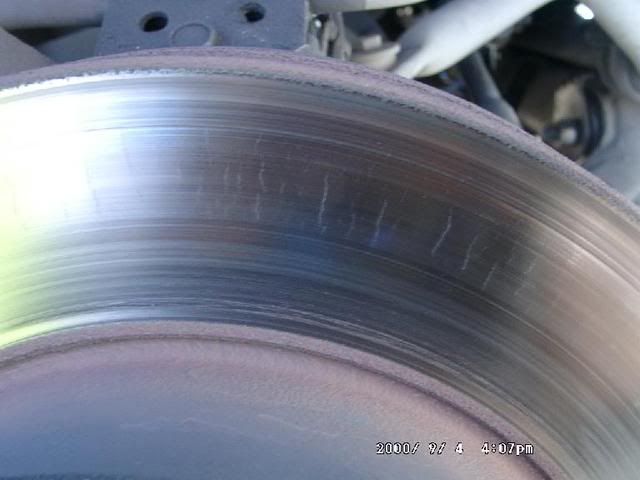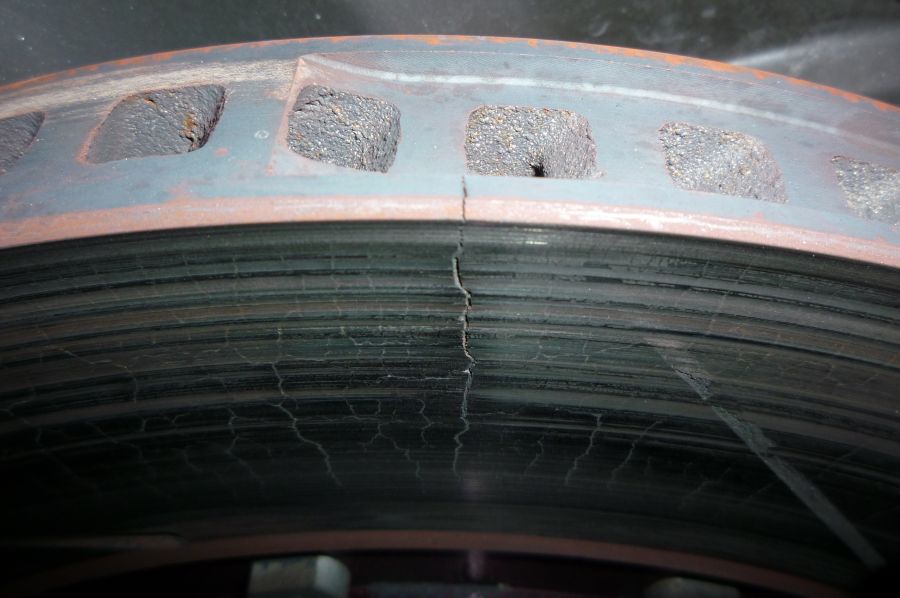Bleeder screw stripped the threads in an aluminum front caliper so I swapped it with a rebuilt one from the auto parts store. The other front caliper is a rebuilt unit with about 50 races or so on it and 5 years old (same as the one that was replaced). Should I replace the other front as well or not a big deal? I flush the brake fluid every race weekend.
You are using an out of date browser. It may not display this or other websites correctly.
You should upgrade or use an alternative browser.
You should upgrade or use an alternative browser.
Replace calipers in pairs or not necessary?
- Thread starter markb
- Start date
I always do things in pairs, just like swapping out hubs, 1/2 shafts, etc. Standard maint on the VW is to swap out the entire front drive train every year.
It's not the fluid, its the seals on the pistons, that get hot, crack, and weaken with all of the heat cycles.
It's not the fluid, its the seals on the pistons, that get hot, crack, and weaken with all of the heat cycles.
JohnMcNaughton
Well-known member
Inspect your remaining old caliper for cracks and fatigue. Inspect the caliper bore for wear. If it is visually and structurally sound, replace the seals with a factory repair kit. Or, use a high quality kit from the parts house.
If you are bleeding the brakes every weekend that may be the reason your bleeder valve failed. Don't over torque the screw. Find the next larger bleeder screw, carry the appropriate drill and tap set in your spares. Or, replace the bleeder with the larger bleeder when you rebuild the existing caliper. Make sure the new bleeder does not interfere with the wheel rim.
Inspect your brake rotors for excessive wear and thermal cracking. Check their remaining thickness. Insure the inner and outer surfaces are still parallel and not grooved. I always wore out the rotors before the calipers were used up. Ran several GT1 Corvettes and several RX7's. A simple 3" brake coolong hose, properly venting the interior of the rotor significantly increases the life of the brake system.
If you are bleeding the brakes every weekend that may be the reason your bleeder valve failed. Don't over torque the screw. Find the next larger bleeder screw, carry the appropriate drill and tap set in your spares. Or, replace the bleeder with the larger bleeder when you rebuild the existing caliper. Make sure the new bleeder does not interfere with the wheel rim.
Inspect your brake rotors for excessive wear and thermal cracking. Check their remaining thickness. Insure the inner and outer surfaces are still parallel and not grooved. I always wore out the rotors before the calipers were used up. Ran several GT1 Corvettes and several RX7's. A simple 3" brake coolong hose, properly venting the interior of the rotor significantly increases the life of the brake system.
Matt Blehm
Moderator
What John said.
The Wilwoods on my 240 still look brand new, but I have to replace the seals in them once a season or so because they start to drag. by the time I'm done with a race, it would take 3 people to push my car across the scales. rebuilt the front calipers and it's a 1-hand push again.
Same for the RX7.. After 5 years of sitting, all 4 calipers were basically seized. Fortuantely I bought all of HArt's spares and there were some OEM caliper kits in the pile. couple hours of rebuilding calipers and the thing runs like new again.
My personal setup is a spare caliper ready to go in the trailer and a rebuild kit in the bins at home. If I have a problem at the track, I slap on another caliper vs. dealing with a messy caliper rebuild while I'm in a hurry.
As for the bleeder screws, they're pretty small on the 1st Gen calipers- they scare me with how small they are because of the stripping/breaking fear. I'm not sure if 2nd Gen are the same as 1st.. If so, you might look at some Nissan bleeder screws that use a 10x1.0mm thread vs. the 8mm or so that Mazda uses.
The Wilwoods on my 240 still look brand new, but I have to replace the seals in them once a season or so because they start to drag. by the time I'm done with a race, it would take 3 people to push my car across the scales. rebuilt the front calipers and it's a 1-hand push again.
Same for the RX7.. After 5 years of sitting, all 4 calipers were basically seized. Fortuantely I bought all of HArt's spares and there were some OEM caliper kits in the pile. couple hours of rebuilding calipers and the thing runs like new again.
My personal setup is a spare caliper ready to go in the trailer and a rebuild kit in the bins at home. If I have a problem at the track, I slap on another caliper vs. dealing with a messy caliper rebuild while I'm in a hurry.
As for the bleeder screws, they're pretty small on the 1st Gen calipers- they scare me with how small they are because of the stripping/breaking fear. I'm not sure if 2nd Gen are the same as 1st.. If so, you might look at some Nissan bleeder screws that use a 10x1.0mm thread vs. the 8mm or so that Mazda uses.
Steve Eckerich
Well-known member
Rebuild/replace as a pair and mark the date in your setup book. Then you know the hours on both. Never use anything but a 6 point wrench or socket on the Mazda bleeders. Use some dielectric grease on the threads of the bleeder and they last forever.
Matt Blehm
Moderator
I wrap a few turns of teflon tape around them. seems to work a bit better than grease to keep the fluid from seeping out around the threads.Steve Eckerich":n0j8d38u said:Rebuild/replace as a pair and mark the date in your setup book. Then you know the hours on both. Never use anything but a 6 point wrench or socket on the Mazda bleeders. Use some dielectric grease on the threads of the bleeder and they last forever.
Jay Lutz
Well-known member
As a former brake design engineer for Ford, Kelsey Hayes, Bendix..........there is no need to replace calipers in pairs.
They are nothing more than hydraulic C clamps and variations due to friction material coefficients right to left FAR outweigh any trivial frictional differences in right to left clamping force.
Proceed at your own risk as always........... but that's what I do.
They are nothing more than hydraulic C clamps and variations due to friction material coefficients right to left FAR outweigh any trivial frictional differences in right to left clamping force.
Proceed at your own risk as always........... but that's what I do.
Matt Blehm
Moderator
My rule of thumb for is that wear items like caliper seals and wheel bearings typically have similar lifespans. If my RF caliper just blew a seal, then the LF caliper is probably not far behind. you have to open the brake system to rebuild or replace one caliper, so you might as well just rebuild both and mark it in the book.
If it was a slider pin that seized, then that's more typically installation/weather related. the only time I've had one seize on my cars is when I installed a boot wrong and didn't have enough grease on the thing.
If it was a slider pin that seized, then that's more typically installation/weather related. the only time I've had one seize on my cars is when I installed a boot wrong and didn't have enough grease on the thing.
JohnMcNaughton
Well-known member
Jay, brake discs develop heat and stress cracks over time. What criteria should be used to determine if a brake disc should be dicarded?
Matt Blehm
Moderator
This is OK..

This is where I throw them away.

This shouldn't ever happen.

I have had rotors that look like the above run for seasons. Eventually a few of the cracks will propagate to the edge of the rotor or very near it, but usually mine grow quite slowly. I always keep one set of spare rotors readily available and run them until cracks get close to the edge or look deep enough that I'm concerned they might go through the rotor. My personal limit is when I see the cracks look like the one that's at 3:00 in the lower picture. I'll finish the day on a rotor like that, checking after each session to make sure they don't look like #2.

This is where I throw them away.

This shouldn't ever happen.

I have had rotors that look like the above run for seasons. Eventually a few of the cracks will propagate to the edge of the rotor or very near it, but usually mine grow quite slowly. I always keep one set of spare rotors readily available and run them until cracks get close to the edge or look deep enough that I'm concerned they might go through the rotor. My personal limit is when I see the cracks look like the one that's at 3:00 in the lower picture. I'll finish the day on a rotor like that, checking after each session to make sure they don't look like #2.
